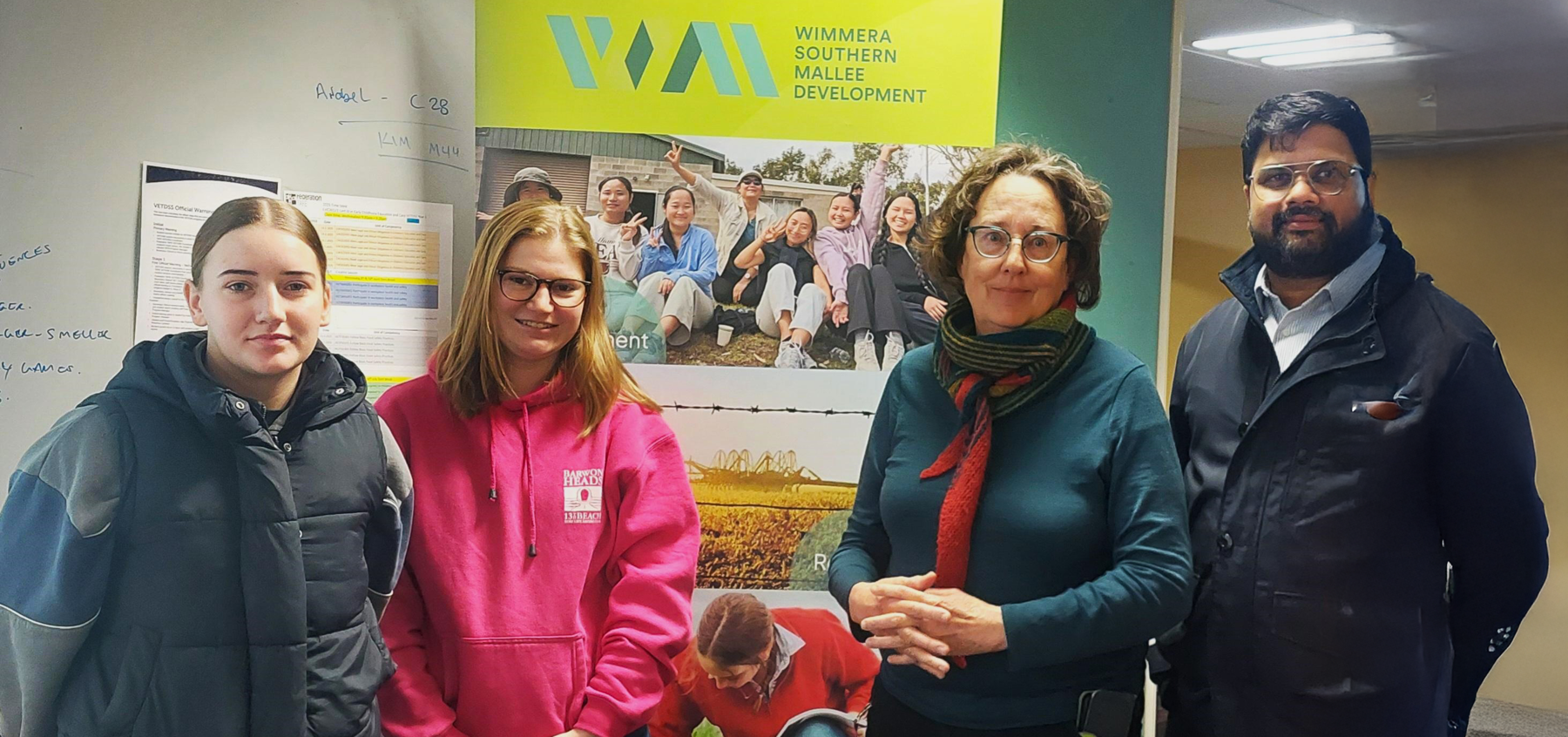Federation TAFE partnership opens doors to early childhood careers in Wimmera

Federation TAFE Wimmera Certificate III in Early Childhood Education and Care students, Sophie Sarr and Amelia Drendel, Federation University's Fiona Carine, and Wimmera Southern Mallee Development's Binesh Tholath.
An innovative regional partnership is transforming access to training and careers in the care sector across Western Victoria. The “Accessing Latent Care Industry Workforces for Western Victoria” project, a collaboration between Federation University Australia, Wimmera Southern Mallee Development (WSMD), and Federation’s Future Regions Research Centre (FRRC), is removing barriers to study, addressing skills shortages, and helping build a sustainable local workforce.
Now in its final year, this three-year project is funded by the Workforce Training Innovation Fund (WTIF) through the Department of Jobs, Skills, Industry and Regions. It aims to address critical workforce shortages in caring industries including early childhood education, aged care, disability support, and community services by supporting people who may otherwise face barriers to study.
“Living in a smaller town shouldn’t stop someone from studying or building a career. This project is helping unlock the potential of people who are ready to work but face barriers like distance, caring responsibilities or travel costs. We’re proud to work with Federation University to back students with practical support that makes study genuinely accessible — and opens real job opportunities close to home,” said Chris Souness, CEO of WSMD.
The project combines local research, led by Dr Cathy Tischler, Director of the Future Regions Research Centre at Federation University’s Wimmera Campus, with training delivery by Federation TAFE. Research has shown that many potential students face challenges such as caring responsibilities, financial hardship, or geographic isolation. In response, the program offers a suite of supports including:
• Free TAFE tuition
• Fuel vouchers to ease travel costs
• Laptop and textbook loans
• Tutoring and academic support
• Assistance with local work placements
• Connections to employment opportunities
“The research has identified that students wanting to study often have significant responsibilities elsewhere, such as caring for children, needing to work and challenges with funding the cost of getting to class,” said Dr Tischler.
One student who has benefited from these supports is Amelia Drendel, who travelled from Nhill to Horsham to study the Certificate III in Early Childhood Education and Care. Amelia originally had a goal of becoming a nurse however changed direction to pursue her true passion lay of working with children.
“The fuel vouchers have been a huge help. Without them, I wouldn’t have been able to travel to Horsham for my classes,” Amelia said. “The support from Federation has been amazing. My teachers are incredibly understanding and approachable. They’ve made me feel confident and capable, even when I doubted myself. I’ve gained so much knowledge and I’m excited to keep studying and eventually work in a local early learning centre.”
This collaborative project is not only helping individuals access education it’s also providing valuable insights into how to deliver training that works for regional and rural communities.
The next intake of the Certificate III in Early Childhood Education and Care begins in July 2025, with places available for students across the Wimmera Southern Mallee. The course is available in Horsham or via remote study, with flexible delivery to suit individual needs. Applications are now open.
To learn more or apply, contact the Federation University Horsham team on (03) 5362 2628 or visit:
https://www.federation.edu.au/courses/dlba-certificate-iii-in-early-childhood-education-and-care
